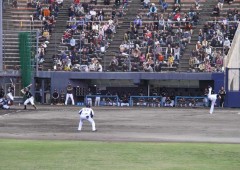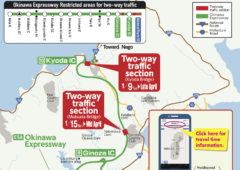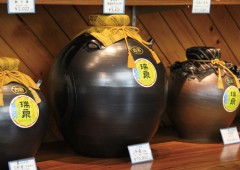2014.01.23
Base relocation plan to continue despite Nago election
Prime Minister Shinzo Abe’s central government has dismissed Sunday’s Nago mayoral election results as meaning little, and vows plans for a replacement airfield in northern Okinawa will continue as designed.
Despite threats from newly re-elected Nago Mayor Susumu Inamine that he will make every effort to block landfill operations that will lead to creation of the Futenma Replacement Facility at Camp Schwab in his city’s Henoko district, both the Tokyo government and Okinawa Governor Hirokazu Nakaima say there’s really little that the mayor can do to stop progress. Inamine, a longtime opponent of moving Futenma Marine Corps Air Station to his city, Sunday defeated pro-base challenger and former Okinawa Assemblyman Bunshin Suematsu 19,839 votes to 15,684 in an election that brought a high 76.1% voter turnout.
Japan’s Defense Minister, Itsunori Onodera, has brushed aside the election results, saying “this is a local election, so I don’t think this will directly influence the issue.” Yoshihide Suga, the Chief Cabinet Secretary, called the Nago result “very regrettable” but insisted the central government will continue working to “patiently” change Inamine’s mind. Suga explains “there will be no change in going ahead, because Japan is a country ruled by law and we will carry this out based on legal procedures.”
Inamine says that’s simply not going to happen, insisting he’s got the power to stop the project by blocking and refusing to sign documents needed for construction of the airfield and the military port. “I will reject all procedures that are premised on the landfill project. Without the mayor’s approval and consent, this process cannot go forward,” he says, noting “in order to protect the future for our children, I will not allow a new base to be built.” Inamine says Futenma should be moved outside Okinawa, and not to his neighborhood.
Government officials concede Inamine could hamper use of roads and other facilities, but cannot shut down the project. Governor Nakaima last month approved the project, after wrangling that lasted several prefectural administrations over a 17 years period.
In the weeks leading up to the Nago election, the central government had committed billions of yen – at least ¥300 billion per year through 2021 — to help Okinawa develop its infrastructure for the future, as well as billions more to pay for a second runway at Naha International Airport and expansion of the island’s light rail. That pledge came shortly before Nakaima agreed to support the landfill project and construction of the new airfield in Oura Bay adjacent to the Marines’ Camp Schwab.
On top of that, the central government only days before the election promised Nago City more than a half-billion U.S. dollars to improve its future. That works out to more than $8,000 per Nago City resident. Inamine blasted that government move, calling it bribery and noting only Nago residents would decide the future of their city.
Observers say Abe’s government is not going to give up on the Futenma Replacement Facility project, or go away, either. The central government says the project is necessary in order to fulfill promises to Okinawa which will lead to a reduction in the number of U.S. troops on the island, and thus, reduce the burdens Okinawans face. “We will steadily proceed, taking seriously the approval for our application for the reclamation,” says Defense Minister Onodera, who stresses “The Futenma base remaining in the current site cannot be accepted. We don’t think the local election will directly affect the relocation to Henoko.”
The alternative, a scholar notes, would be for Tokyo to sit back and wait four years for the next election in Nago, in hopes a more conservative administration will win. That won’t happen, he says, because Futenma’s a dangerous airbase in densely populated Ginowan City. At the same time, he explains, the world situation, with China flexing its military might in southern Okinawa, has Japan and other countries concerned about security, much of which is provided by the U.S. presence on the island. A government source echoes that, pointing out “We have no choice but to unemotionally proceed with the relocation.”

 2024.02.07
2024.02.07 2024.01.31
2024.01.31 2023.12.11
2023.12.11 2023.11.02
2023.11.02 2023.10.26
2023.10.26 2023.09.29
2023.09.29 2023.09.01
2023.09.01 2023.08.22
2023.08.22 2023.08.15
2023.08.15 2023.07.27
2023.07.27






